外研版(2019)必修 第二册Unit3 On the Move Using language非谓语动词不定式课件(共20张PPT)
文档属性
| 名称 | 外研版(2019)必修 第二册Unit3 On the Move Using language非谓语动词不定式课件(共20张PPT) |
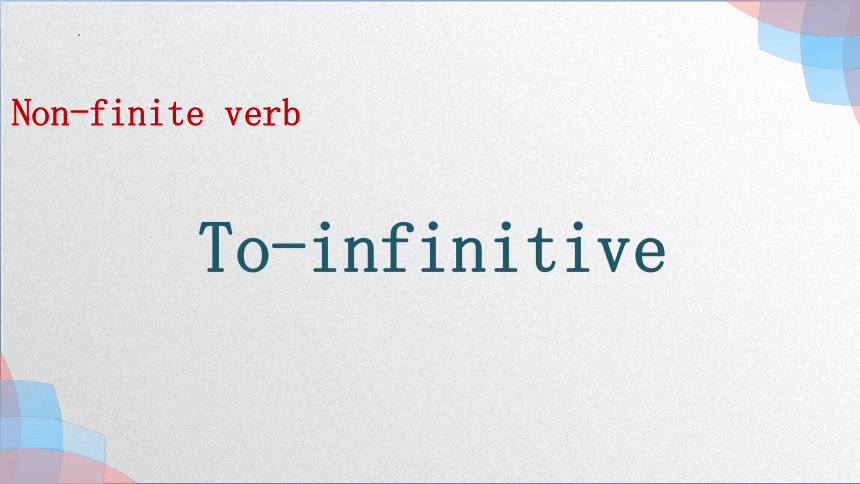
|
|
| 格式 | pptx | ||
| 文件大小 | 521.6KB | ||
| 资源类型 | 教案 | ||
| 版本资源 | 外研版(2019) | ||
| 科目 | 英语 | ||
| 更新时间 | 2024-04-18 00:00:00 | ||
图片预览

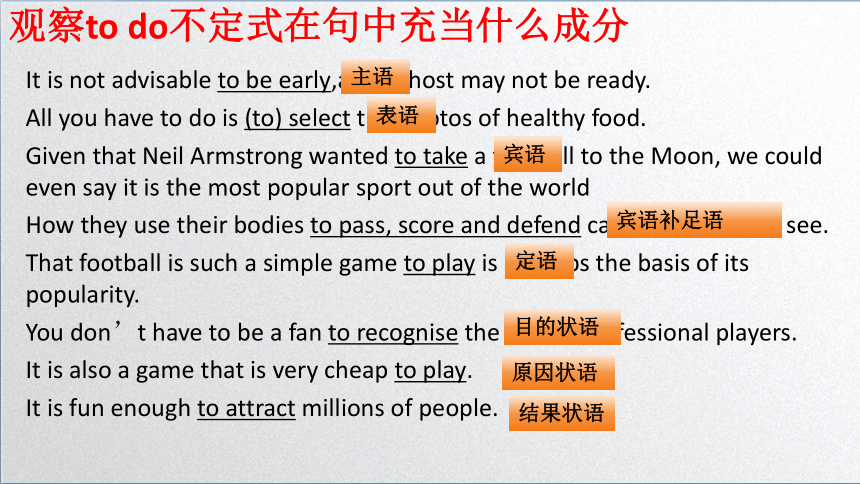

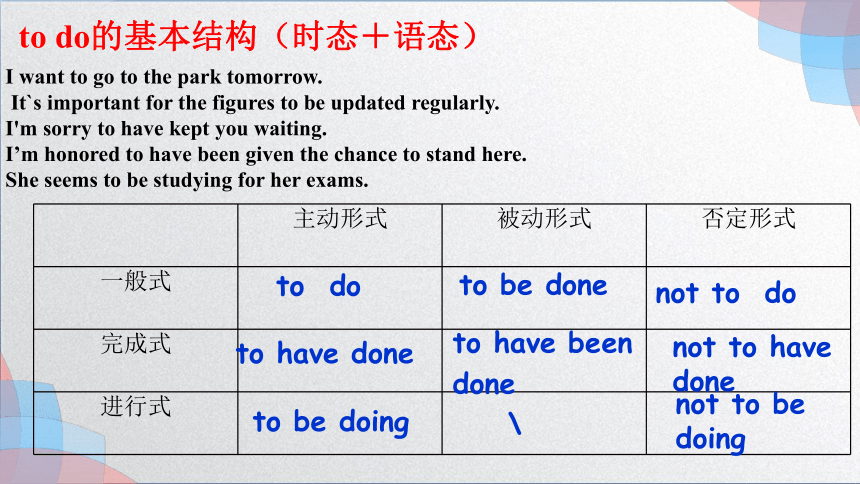


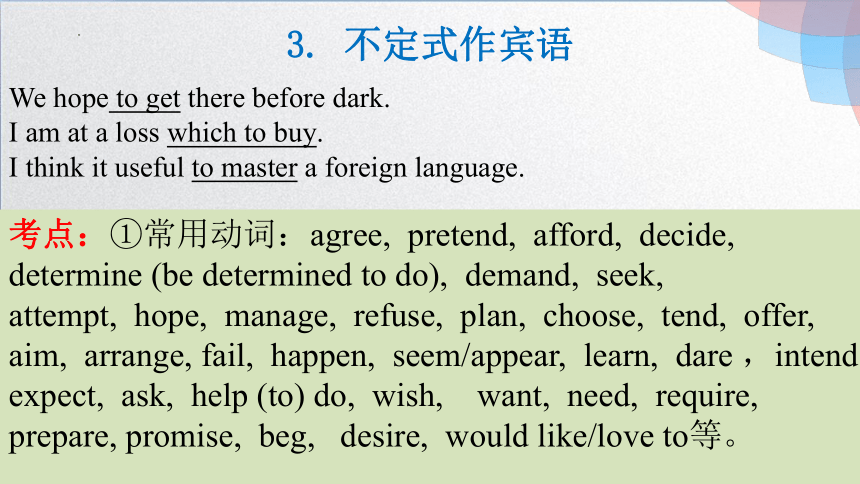
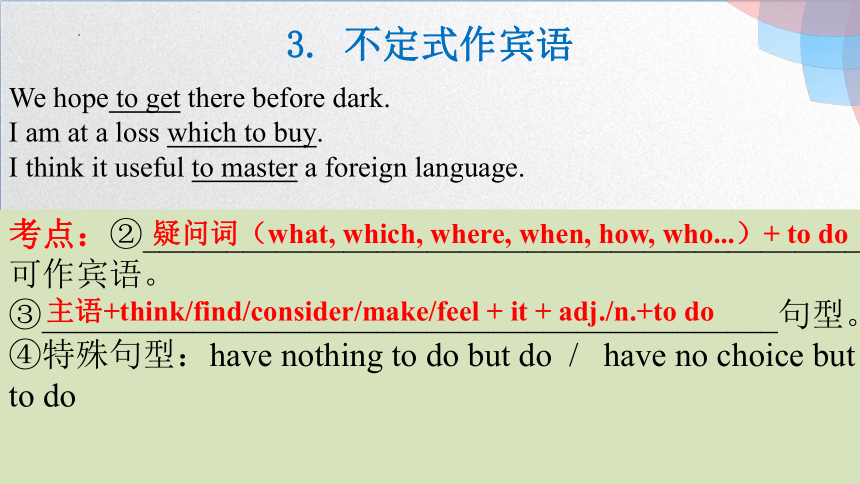
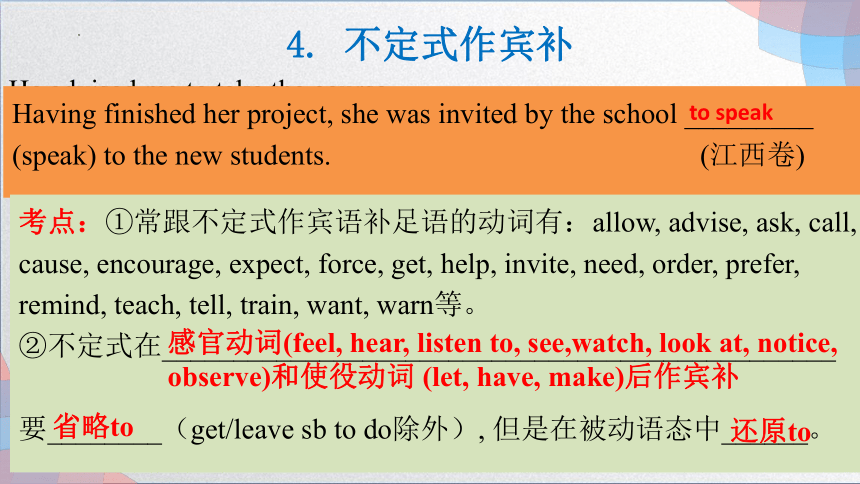
文档简介
(共20张PPT)
Non-finite verb
To-infinitive
观察to do不定式在句中充当什么成分
It is not advisable to be early,as the host may not be ready.
All you have to do is (to) select the photos of healthy food.
Given that Neil Armstrong wanted to take a football to the Moon, we could even say it is the most popular sport out of the world
How they use their bodies to pass, score and defend can be amazing to see.
That football is such a simple game to play is perhaps the basis of its popularity.
You don’t have to be a fan to recognise the skill of professional players.
It is also a game that is very cheap to play.
It is fun enough to attract millions of people.
主语
表语
宾语
宾语补足语
定语
目的状语
原因状语
结果状语
非谓语动词
概念: 非谓语动词是指__________________________________
可在句中充当除___________以外的其它句子成分,即_______________________。
它不随主语的人称和数而变化。
动名词,不定式,现在分词和过去分词
谓语
主语,表语,宾语,宾补,定语和状语
I want to go to the park tomorrow.
It`s important for the figures to be updated regularly.
I'm sorry to have kept you waiting.
I’m honored to have been given the chance to stand here.
She seems to be studying for her exams.
to do的基本结构(时态+语态)
主动形式 被动形式 否定形式
一般式
完成式
进行式
to do
to be done
not to do
to have done
to have been
done
not to have done
to be doing
\
not to be doing
1. 不定式作主语
考点:①不定式作主语表__________________________________的动作,谓语动词都常用________。
②为了保持句子平衡,常采用 “it” 作形式主语。常用句型:________________________。
adj是修饰的不定式则用______ .
adj修饰的不定式的逻辑主语则用______.
It’s important_______us to learn English well.
It’s foolish______him to do it again.
To learn English well in Senior High is very significant.
It is significant to learn English well in Senior High.
To collect the related data is my work in the following weeks.
具体的,一次性动作或将来的
单数
It is adj of / for sb to do sth
for
of
for
of
2. 不定式作表语
考点:①不定式作主语表_____________________________的动作,用来说明主语的内容,主语表语可互换。
②不定式作表语,当主语部分出现动词do,其符号to可以省略。
My work in the following weeks is to collect the related data.
All you have to do is (to) select the photos of healthy food.
具体的,一次性动作或将来的
What I want to do in college is ___________ (improve) my English.
(to) improve
3. 不定式作宾语
考点:①常用动词:agree, pretend, afford, decide, determine (be determined to do), demand, seek,
attempt, hope, manage, refuse, plan, choose, tend, offer, aim, arrange, fail, happen, seem/appear, learn, dare ,intend, expect, ask, help (to) do, wish, want, need, require, prepare, promise, beg, desire, would like/love to等。
We hope to get there before dark.
I am at a loss which to buy.
I think it useful to master a foreign language.
3. 不定式作宾语
考点:②___________________________________________ 可作宾语。
③____________________________________________句型。
④特殊句型:have nothing to do but do / have no choice but to do
We hope to get there before dark.
I am at a loss which to buy.
I think it useful to master a foreign language.
疑问词(what, which, where, when, how, who...)+ to do
主语+think/find/consider/make/feel + it + adj./n.+to do
He advised me to take the course.
I see him cross the road. / He was seen to cross the road.
I had him finish his homework right now.
Having finished her project, she was invited by the school _________ (speak) to the new students. (江西卷)
4. 不定式作宾补
考点:①常跟不定式作宾语补足语的动词有:allow, advise, ask, call, cause, encourage, expect, force, get, help, invite, need, order, prefer, remind, teach, tell, train, want, warn等。
②不定式在_______________________________________________
要________(get/leave sb to do除外), 但是在被动语态中______。
to speak
感官动词(feel, hear, listen to, see,watch, look at, notice, observe)和使役动词 (let, have, make)后作宾补
省略to
还原to
require, forbid, advise, recommend, allow, permit, encourage
+ sb. +to do sth.(接动词的不定式作宾补)
require, forbid, advise, recommend, allow, permit, encourage
+ doing sth.(接动名词作宾语)
注意
I advise you to have a rest.
I advise having a rest.
5. 不定式作定语
考点一:不定式作定语,与被修饰的词语有逻辑上的主谓关系或动宾关系,表示该事情____________。
Do you have a knife to cut the watermelon I plan to attend the party to be held tomorrow.
将来会发生
The public has faith in his ability to handle the job.
She kept her promise to visit her aunt regularly.
5. 不定式作定语
考点二:一些名词后用不定式作定语:
ability, way, plan, decision, effort, promise, reason, desire, ambition, chance, opportunity, right(权利), courage, measure
He is always the first (one) to get to the office and the last to leave.
5. 不定式作定语
考点三:当名词被 用不定式作定语。
序数词first, last, only和最高级修饰时
He is looking for a room to live in.
Give me a pen to write with.
5. 不定式作定语
考点四:如果不定式动词为不及物动词,或者不定式所修饰的名词或代词是不定式动作的地点、工具等时,不定式后面必须有相应的_________,但是time, place, way除外。
介词
Do you have something to drink
It’s a difficult question to answer.
5. 不定式作定语
考点五:特殊句式:
have sth to do
当被修饰名词前有形容该物本质性质的形容词时,后置定语一般用主动形式。
What have I said to make you so angry
6. 不定式作状语
考点一:
作结果状语,表意料之外的结果。
常见句型:
Would you be so kind as to lend me your bicycle
I’m not such a fool as to believe that.
The boy is old enough to go to school.
so …as to …如此...去做
such (…) as to …如此...去做
enough to …足以做某事
What have I said to make you so angry
6. 不定式作状语
考点一:
作结果状语,表意料之外的结果。
常见句型:
He is too young to dress himself.
He hurried to the station only to find the train had left.
He returned home to learn his daughter has just been engaged.
too … to …太…以至于不能
only to do 不料,没有想到
与“learn, make, see, hear, find”连用
He had to write and sell stories to make a living.
To make friends easily, you need to be very kind.
6. 不定式作状语
考点二:
作目的状语,可位于句首或句末,位于句末时不能用逗号隔开。
常见句型:
He came here in order to see Charlie.
He shouted and waved so as to be noticed.
in order to do 为了
so as to do 为了
I’m glad / pleased to see you.
The box is not easy to carry.
6. 不定式作状语
考点三:作___________,用在表_________等的形容词后或表_________的形容词后:sorry, surprised, happy, glad, eager, angry, foolish, right, wrong, slow, quick, rude, cruel, disappointed / easy, difficult, hard, interesting, comfortable,safe,dangerous,impossible等。
原因状语
喜怒哀乐
性质
Thank you!
Non-finite verb
To-infinitive
观察to do不定式在句中充当什么成分
It is not advisable to be early,as the host may not be ready.
All you have to do is (to) select the photos of healthy food.
Given that Neil Armstrong wanted to take a football to the Moon, we could even say it is the most popular sport out of the world
How they use their bodies to pass, score and defend can be amazing to see.
That football is such a simple game to play is perhaps the basis of its popularity.
You don’t have to be a fan to recognise the skill of professional players.
It is also a game that is very cheap to play.
It is fun enough to attract millions of people.
主语
表语
宾语
宾语补足语
定语
目的状语
原因状语
结果状语
非谓语动词
概念: 非谓语动词是指__________________________________
可在句中充当除___________以外的其它句子成分,即_______________________。
它不随主语的人称和数而变化。
动名词,不定式,现在分词和过去分词
谓语
主语,表语,宾语,宾补,定语和状语
I want to go to the park tomorrow.
It`s important for the figures to be updated regularly.
I'm sorry to have kept you waiting.
I’m honored to have been given the chance to stand here.
She seems to be studying for her exams.
to do的基本结构(时态+语态)
主动形式 被动形式 否定形式
一般式
完成式
进行式
to do
to be done
not to do
to have done
to have been
done
not to have done
to be doing
\
not to be doing
1. 不定式作主语
考点:①不定式作主语表__________________________________的动作,谓语动词都常用________。
②为了保持句子平衡,常采用 “it” 作形式主语。常用句型:________________________。
adj是修饰的不定式则用______ .
adj修饰的不定式的逻辑主语则用______.
It’s important_______us to learn English well.
It’s foolish______him to do it again.
To learn English well in Senior High is very significant.
It is significant to learn English well in Senior High.
To collect the related data is my work in the following weeks.
具体的,一次性动作或将来的
单数
It is adj of / for sb to do sth
for
of
for
of
2. 不定式作表语
考点:①不定式作主语表_____________________________的动作,用来说明主语的内容,主语表语可互换。
②不定式作表语,当主语部分出现动词do,其符号to可以省略。
My work in the following weeks is to collect the related data.
All you have to do is (to) select the photos of healthy food.
具体的,一次性动作或将来的
What I want to do in college is ___________ (improve) my English.
(to) improve
3. 不定式作宾语
考点:①常用动词:agree, pretend, afford, decide, determine (be determined to do), demand, seek,
attempt, hope, manage, refuse, plan, choose, tend, offer, aim, arrange, fail, happen, seem/appear, learn, dare ,intend, expect, ask, help (to) do, wish, want, need, require, prepare, promise, beg, desire, would like/love to等。
We hope to get there before dark.
I am at a loss which to buy.
I think it useful to master a foreign language.
3. 不定式作宾语
考点:②___________________________________________ 可作宾语。
③____________________________________________句型。
④特殊句型:have nothing to do but do / have no choice but to do
We hope to get there before dark.
I am at a loss which to buy.
I think it useful to master a foreign language.
疑问词(what, which, where, when, how, who...)+ to do
主语+think/find/consider/make/feel + it + adj./n.+to do
He advised me to take the course.
I see him cross the road. / He was seen to cross the road.
I had him finish his homework right now.
Having finished her project, she was invited by the school _________ (speak) to the new students. (江西卷)
4. 不定式作宾补
考点:①常跟不定式作宾语补足语的动词有:allow, advise, ask, call, cause, encourage, expect, force, get, help, invite, need, order, prefer, remind, teach, tell, train, want, warn等。
②不定式在_______________________________________________
要________(get/leave sb to do除外), 但是在被动语态中______。
to speak
感官动词(feel, hear, listen to, see,watch, look at, notice, observe)和使役动词 (let, have, make)后作宾补
省略to
还原to
require, forbid, advise, recommend, allow, permit, encourage
+ sb. +to do sth.(接动词的不定式作宾补)
require, forbid, advise, recommend, allow, permit, encourage
+ doing sth.(接动名词作宾语)
注意
I advise you to have a rest.
I advise having a rest.
5. 不定式作定语
考点一:不定式作定语,与被修饰的词语有逻辑上的主谓关系或动宾关系,表示该事情____________。
Do you have a knife to cut the watermelon I plan to attend the party to be held tomorrow.
将来会发生
The public has faith in his ability to handle the job.
She kept her promise to visit her aunt regularly.
5. 不定式作定语
考点二:一些名词后用不定式作定语:
ability, way, plan, decision, effort, promise, reason, desire, ambition, chance, opportunity, right(权利), courage, measure
He is always the first (one) to get to the office and the last to leave.
5. 不定式作定语
考点三:当名词被 用不定式作定语。
序数词first, last, only和最高级修饰时
He is looking for a room to live in.
Give me a pen to write with.
5. 不定式作定语
考点四:如果不定式动词为不及物动词,或者不定式所修饰的名词或代词是不定式动作的地点、工具等时,不定式后面必须有相应的_________,但是time, place, way除外。
介词
Do you have something to drink
It’s a difficult question to answer.
5. 不定式作定语
考点五:特殊句式:
have sth to do
当被修饰名词前有形容该物本质性质的形容词时,后置定语一般用主动形式。
What have I said to make you so angry
6. 不定式作状语
考点一:
作结果状语,表意料之外的结果。
常见句型:
Would you be so kind as to lend me your bicycle
I’m not such a fool as to believe that.
The boy is old enough to go to school.
so …as to …如此...去做
such (…) as to …如此...去做
enough to …足以做某事
What have I said to make you so angry
6. 不定式作状语
考点一:
作结果状语,表意料之外的结果。
常见句型:
He is too young to dress himself.
He hurried to the station only to find the train had left.
He returned home to learn his daughter has just been engaged.
too … to …太…以至于不能
only to do 不料,没有想到
与“learn, make, see, hear, find”连用
He had to write and sell stories to make a living.
To make friends easily, you need to be very kind.
6. 不定式作状语
考点二:
作目的状语,可位于句首或句末,位于句末时不能用逗号隔开。
常见句型:
He came here in order to see Charlie.
He shouted and waved so as to be noticed.
in order to do 为了
so as to do 为了
I’m glad / pleased to see you.
The box is not easy to carry.
6. 不定式作状语
考点三:作___________,用在表_________等的形容词后或表_________的形容词后:sorry, surprised, happy, glad, eager, angry, foolish, right, wrong, slow, quick, rude, cruel, disappointed / easy, difficult, hard, interesting, comfortable,safe,dangerous,impossible等。
原因状语
喜怒哀乐
性质
Thank you!
